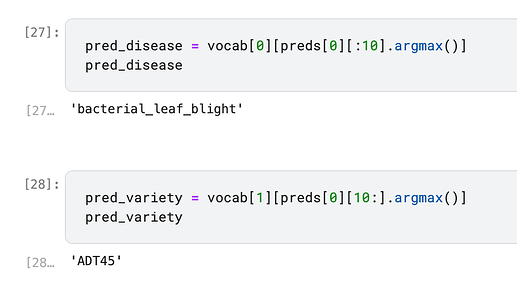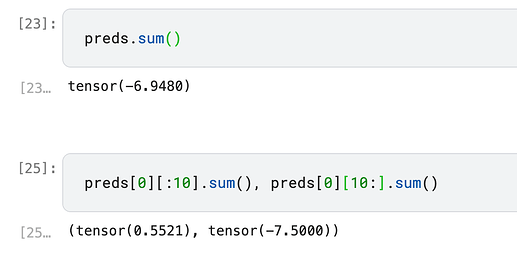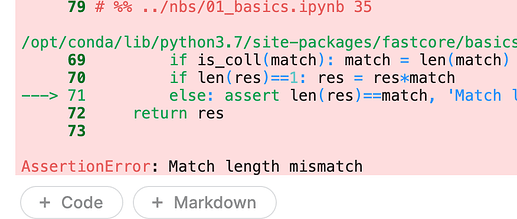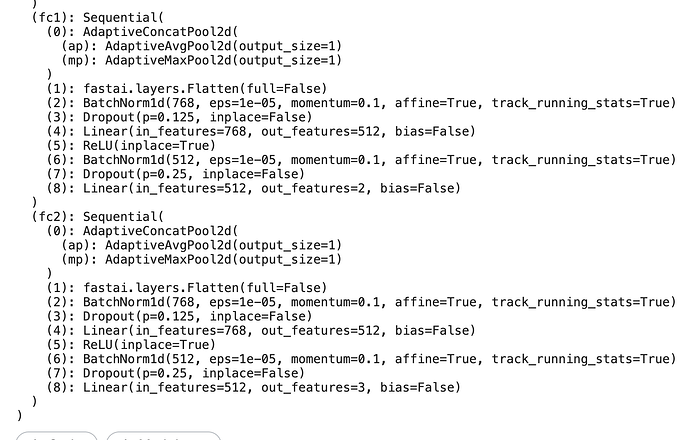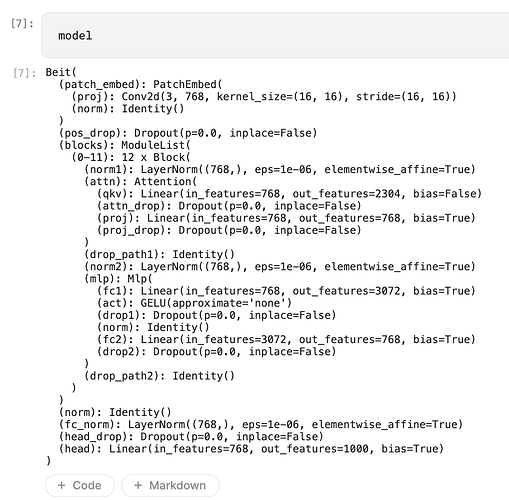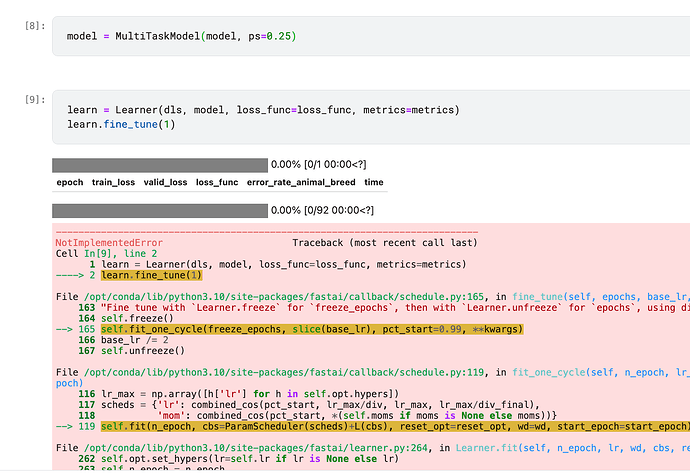yes the part you mentioned works but when i go to train part :
learn = Learner(dls, model, loss_func=loss_func, metrics=metrics)
learn.fine_tune(10)
i got this error
---------------------------------------------------------------------------
NotImplementedError Traceback (most recent call last)
Input In [10], in <cell line: 3>()
1 #learn.fit_one_cycle(0,lr=1e-2)
2 lr = 0.001
----> 3 learn.fine_tune(0, lr)
File ~/.local/lib/python3.8/site-packages/fastai/callback/schedule.py:165, in fine_tune(self, epochs, base_lr, freeze_epochs, lr_mult, pct_start, div, **kwargs)
163 "Fine tune with `Learner.freeze` for `freeze_epochs`, then with `Learner.unfreeze` for `epochs`, using discriminative LR."
164 self.freeze()
--> 165 self.fit_one_cycle(freeze_epochs, slice(base_lr), pct_start=0.99, **kwargs)
166 base_lr /= 2
167 self.unfreeze()
File ~/.local/lib/python3.8/site-packages/fastai/callback/schedule.py:119, in fit_one_cycle(self, n_epoch, lr_max, div, div_final, pct_start, wd, moms, cbs, reset_opt, start_epoch)
116 lr_max = np.array([h['lr'] for h in self.opt.hypers])
117 scheds = {'lr': combined_cos(pct_start, lr_max/div, lr_max, lr_max/div_final),
118 'mom': combined_cos(pct_start, *(self.moms if moms is None else moms))}
--> 119 self.fit(n_epoch, cbs=ParamScheduler(scheds)+L(cbs), reset_opt=reset_opt, wd=wd, start_epoch=start_epoch)
File ~/.local/lib/python3.8/site-packages/fastai/learner.py:264, in Learner.fit(self, n_epoch, lr, wd, cbs, reset_opt, start_epoch)
262 self.opt.set_hypers(lr=self.lr if lr is None else lr)
263 self.n_epoch = n_epoch
--> 264 self._with_events(self._do_fit, 'fit', CancelFitException, self._end_cleanup)
File ~/.local/lib/python3.8/site-packages/fastai/learner.py:199, in Learner._with_events(self, f, event_type, ex, final)
198 def _with_events(self, f, event_type, ex, final=noop):
--> 199 try: self(f'before_{event_type}'); f()
200 except ex: self(f'after_cancel_{event_type}')
201 self(f'after_{event_type}'); final()
File ~/.local/lib/python3.8/site-packages/fastai/learner.py:253, in Learner._do_fit(self)
251 for epoch in range(self.n_epoch):
252 self.epoch=epoch
--> 253 self._with_events(self._do_epoch, 'epoch', CancelEpochException)
File ~/.local/lib/python3.8/site-packages/fastai/learner.py:199, in Learner._with_events(self, f, event_type, ex, final)
198 def _with_events(self, f, event_type, ex, final=noop):
--> 199 try: self(f'before_{event_type}'); f()
200 except ex: self(f'after_cancel_{event_type}')
201 self(f'after_{event_type}'); final()
File ~/.local/lib/python3.8/site-packages/fastai/learner.py:247, in Learner._do_epoch(self)
246 def _do_epoch(self):
--> 247 self._do_epoch_train()
248 self._do_epoch_validate()
File ~/.local/lib/python3.8/site-packages/fastai/learner.py:239, in Learner._do_epoch_train(self)
237 def _do_epoch_train(self):
238 self.dl = self.dls.train
--> 239 self._with_events(self.all_batches, 'train', CancelTrainException)
File ~/.local/lib/python3.8/site-packages/fastai/learner.py:199, in Learner._with_events(self, f, event_type, ex, final)
198 def _with_events(self, f, event_type, ex, final=noop):
--> 199 try: self(f'before_{event_type}'); f()
200 except ex: self(f'after_cancel_{event_type}')
201 self(f'after_{event_type}'); final()
File ~/.local/lib/python3.8/site-packages/fastai/learner.py:205, in Learner.all_batches(self)
203 def all_batches(self):
204 self.n_iter = len(self.dl)
--> 205 for o in enumerate(self.dl): self.one_batch(*o)
File ~/.local/lib/python3.8/site-packages/fastai/learner.py:235, in Learner.one_batch(self, i, b)
233 b = self._set_device(b)
234 self._split(b)
--> 235 self._with_events(self._do_one_batch, 'batch', CancelBatchException)
File ~/.local/lib/python3.8/site-packages/fastai/learner.py:199, in Learner._with_events(self, f, event_type, ex, final)
198 def _with_events(self, f, event_type, ex, final=noop):
--> 199 try: self(f'before_{event_type}'); f()
200 except ex: self(f'after_cancel_{event_type}')
201 self(f'after_{event_type}'); final()
File ~/.local/lib/python3.8/site-packages/fastai/learner.py:216, in Learner._do_one_batch(self)
215 def _do_one_batch(self):
--> 216 self.pred = self.model(*self.xb)
217 self('after_pred')
218 if len(self.yb):
File ~/.local/lib/python3.8/site-packages/torch/nn/modules/module.py:1130, in Module._call_impl(self, *input, **kwargs)
1126 # If we don't have any hooks, we want to skip the rest of the logic in
1127 # this function, and just call forward.
1128 if not (self._backward_hooks or self._forward_hooks or self._forward_pre_hooks or _global_backward_hooks
1129 or _global_forward_hooks or _global_forward_pre_hooks):
-> 1130 return forward_call(*input, **kwargs)
1131 # Do not call functions when jit is used
1132 full_backward_hooks, non_full_backward_hooks = [], []
Input In [5], in MultiTaskModel.forward(self, x)
22 def forward(self, x):
---> 23 features = self.encoder(x)
24 class1 = self.fc1(features[-1]) # Assuming the last layer's output is used
25 class2 = self.fc2(features[-1]) # Assuming the last layer's output is used
File ~/.local/lib/python3.8/site-packages/torch/nn/modules/module.py:1130, in Module._call_impl(self, *input, **kwargs)
1126 # If we don't have any hooks, we want to skip the rest of the logic in
1127 # this function, and just call forward.
1128 if not (self._backward_hooks or self._forward_hooks or self._forward_pre_hooks or _global_backward_hooks
1129 or _global_forward_hooks or _global_forward_pre_hooks):
-> 1130 return forward_call(*input, **kwargs)
1131 # Do not call functions when jit is used
1132 full_backward_hooks, non_full_backward_hooks = [], []
File ~/.local/lib/python3.8/site-packages/torch/nn/modules/container.py:139, in Sequential.forward(self, input)
137 def forward(self, input):
138 for module in self:
--> 139 input = module(input)
140 return input
File ~/.local/lib/python3.8/site-packages/torch/nn/modules/module.py:1130, in Module._call_impl(self, *input, **kwargs)
1126 # If we don't have any hooks, we want to skip the rest of the logic in
1127 # this function, and just call forward.
1128 if not (self._backward_hooks or self._forward_hooks or self._forward_pre_hooks or _global_backward_hooks
1129 or _global_forward_hooks or _global_forward_pre_hooks):
-> 1130 return forward_call(*input, **kwargs)
1131 # Do not call functions when jit is used
1132 full_backward_hooks, non_full_backward_hooks = [], []
File ~/.local/lib/python3.8/site-packages/torch/nn/modules/module.py:201, in _forward_unimplemented(self, *input)
190 def _forward_unimplemented(self, *input: Any) -> None:
191 r"""Defines the computation performed at every call.
192
193 Should be overridden by all subclasses.
(...)
199 registered hooks while the latter silently ignores them.
200 """
--> 201 raise NotImplementedError(f"Module [{type(self).__name__}] is missing the required \"forward\" function")
NotImplementedError: Module [ModuleList] is missing the required "forward" function.




